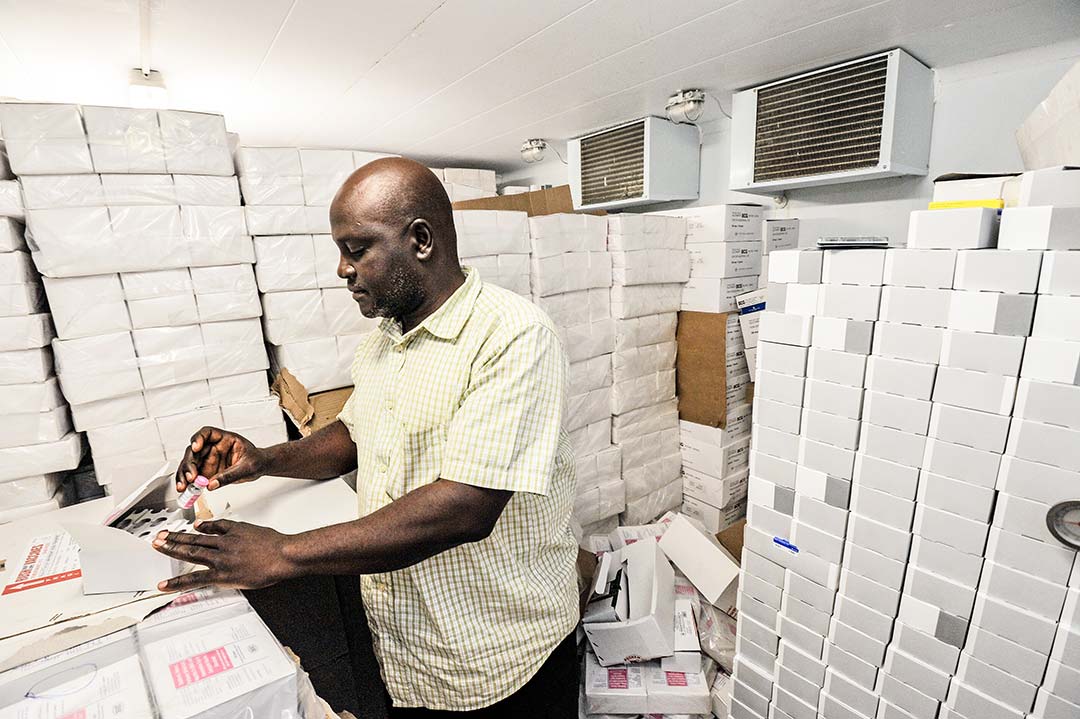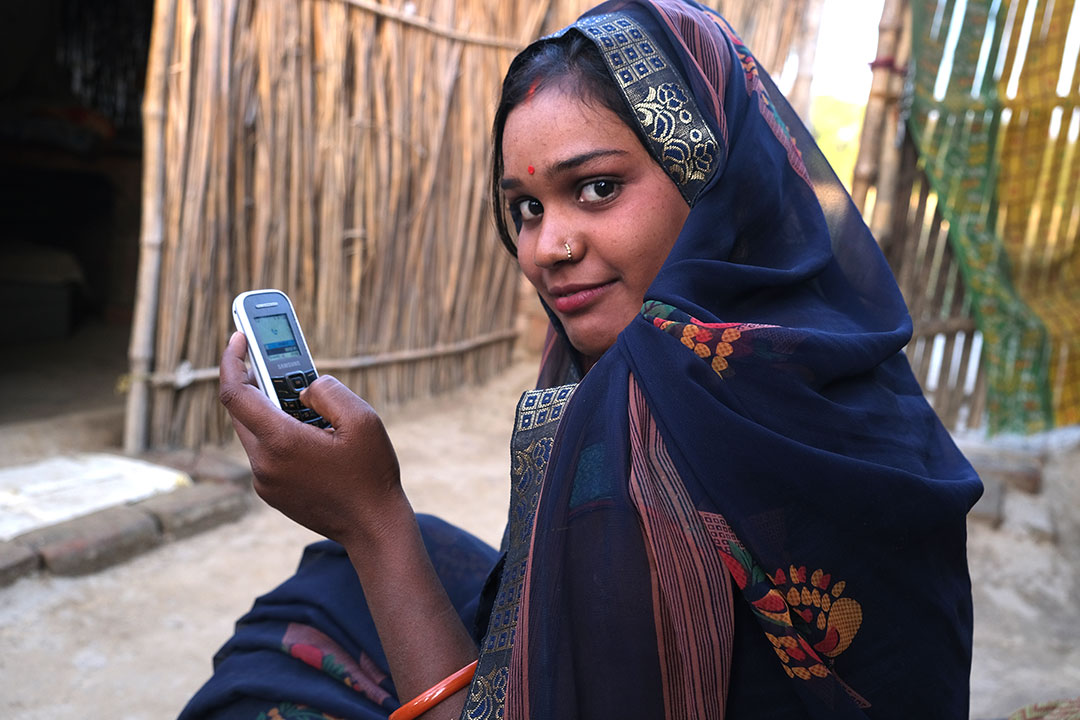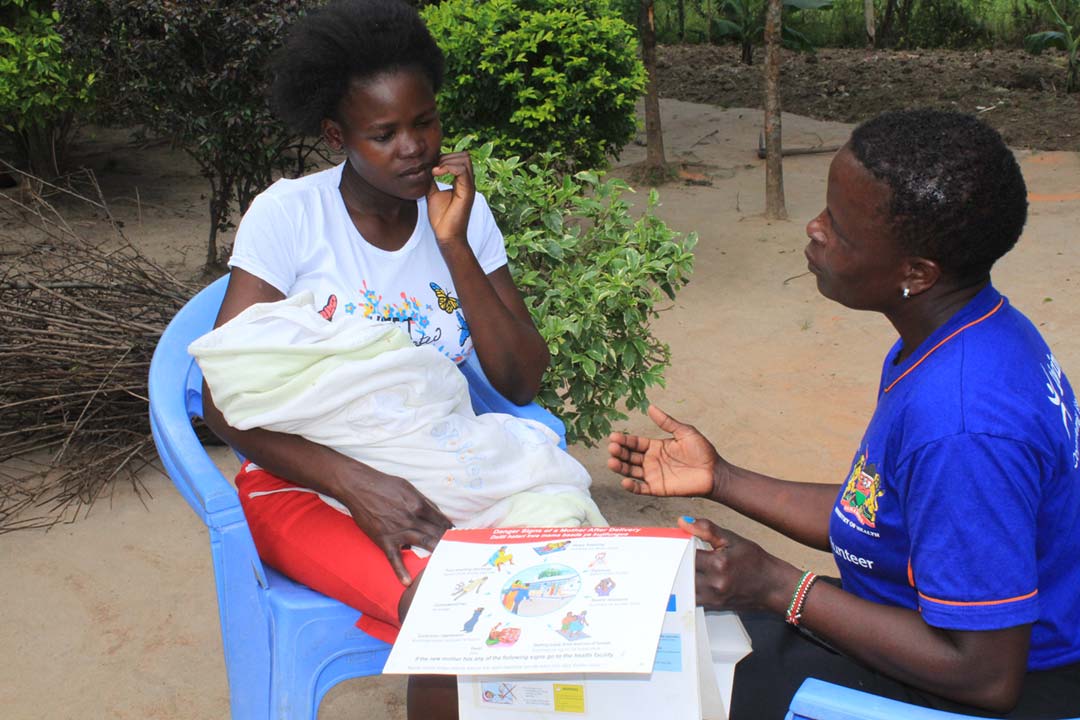Digital tracking of vaccines is boosting health system oversight
Successful pilot programmes in Nigeria and Rwanda show how digital verification and traceability of healthcare products can increase access to medicine through stock and supply chain visibility, even as it helps tackle the growing problem of substandard and falsified products.
- 7 December 2022
- 6 min read
- by Edward Brydon

Getting healthcare products to everyone who needs them in low- and middle-income countries (LMICs) isn't always easy. Barriers range from stock running out or expiring, and challenges with identifying who needs vaccines or medicines, to drug counterfeiting, which can cost an estimated US$30.5 billion each year.
This poses a significant problem for the health of people and economies in these countries. A new digital system to verify and trace vaccines and medicines aims to tackle these concerns.
Developing a digital tool to trace health products from manufacturer to health centre
The premise is simple: to make sure vaccines reliably get where they're needed, you need to know where they are now, and where they've come from. This visibility is critical for a health system's ability to plan – helping to avoid stock-outs and waste.
Detailed oversight becomes even more consequential when an immunisation programme is introducing a new vaccine, like the COVID-19 jab, or the pioneering malaria vaccine currently being administered in some African countries as part of large-scale pilot programmes. New products often come with new infrastructures, systems and processes, which can make keeping track of them more challenging — and even more vital for exactly that reason.
Additionally, new drugs and vaccines are sometimes in greater demand than the supply can meet. This makes them more vulnerable to falsification, a trend in clear evidence during the first phase of the COVID-19 pandemic. By July 2020, the UN was 'extremely concerned' about the surge in substandard and falsified healthcare products. Counterfeiting is typically less of a concern for vaccines than medicines, but soon after the first COVID-19 vaccines were approved, there were reports of fake versions circulating in Nigeria. It was not an isolated issue, as WHO reports from 2021 reveal.
More than anything, these alarming instances highlighted the need for the ability to track and trace health products on their journey from manufacturer to health professional.
To tackle these issues, Gavi provided seed funding of US $5 million in 2020 to kick start development and initial testing of a tool to verify the authenticity for vaccines, tests and medicines and other health products – the Traceability and Verification System (TRVST).
Developed under the Verification and Traceability Initiative (VTI) – a partnership between UNICEF, Gavi, The Bill & Melinda Gates Foundation, the Global Fund, USAID, national regulatory authorities in Nigeria and Rwanda, Vital Wave, and the World Bank – TRVST allows countries to verify the authenticity of health products and track them through the supply chain.
How TRVST works
It's as simple as scanning a barcode using a computer or smartphone app. When a manufacturer is ready to ship a batch of health products, they'll attach a digital barcode, known as a GS1 barcode, to the product and upload the barcode and important information – like destination, product type and expiry date – to a global database, accessible to countries using the programme.
The information contained within the unique serial number on the barcode makes it easier to identify the product as genuine and track its location through GPS and unique geo location numbers.
Have you read?
The government in that country, or a health professional on the ground, can then scan a box of the health products, such as COVID-19 vaccines, and get verification from the system that they are genuine and trace them through the supply chain.

2. The TRVST repository
3. Verification smartphone application and API
4. The TRVST dashboard
5. TRVST API interface to national systems
Pilot programme impact
The first version of TRVST, launched in Nigeria and Rwanda, was used to establish trust in the programme and in health products more broadly, starting with digital barcodes and data entered by vaccine manufacturer Johnson & Johnson.
In Nigeria, being able to trace pharmaceutical products is crucial to the security of the supply chain, which is beset by many problems, according to John Kayode, Assistant Chief Regulatory Officer at the National Agency for Food and Drug Administration and Control, Nigeria.
"The supply chain may be broken, medicines expired, not stored correctly, or not available when needed. Inventory management is not optimal. There is diversion of medicines from public sector and donor supported programmes, and infiltration of the supply chain with substandard or falsified medicines is still a major challenge," says Kayode.
Vaccine supply chains are broadly more orderly than those funnelling therapeutic drugs to their patient-facing destinations, but TRVST is likely to mitigate the inventory challenges that do crop up. Based on the trial, Kayode anticipates that TRVST will become part of the system to track and trace both vaccines and other health supplies in his country.
For Nigeria, Rwanda and for the other countries aiming to take up TRVST, the effects are expected to be felt at both ends of the supply chain — from forecasting to injection. As Thabani Maphosa, Managing Director of Country Programmes at Gavi, anticipates, "the TRVST initiative will help countries strengthen supply planning and deliver safe and effective vaccines and other health products."
Expanding traceability for more medicines to more countries
Before the end of 2022, a new version of the app that will allow users to track vaccines and medicines from dispatch to delivery will be launched.
Using unique geo-location numbers for storage facilities and GPS data, governments and health workers will be able to track and trace the physical movement of the product across the supply chain, reducing the risk of stocks running out and improving availability.
The detailed information contained within the GS1 barcode technology also means vaccine or medical product information can be retrieved for batch packages or even individual vials or bottles.
The team is also working to expand the number and range of products included in TRVST, including routinely administered vaccines, malaria vaccines and medicines for HIV, malaria and tuberculosis.
After a successful pilot launch, both Nigeria and Rwanda are planning to move forward with the system . And more countries are expected to join the initiative in the near future, with Malawi, Tanzania, Liberia and Nepal already in the planning stages.
But realising end-to-end traceability is no small endeavour, cautions Gavi's Sachin Jagtap, who co-leads the TRVST project. Many moving parts will need, in each country, to come together - from policy and regulation frameworks, to hardware infrastructure and manufacturer commitment. Jagtap says, "a strong foundation has been laid for building this ambitious structure, and in the coming five years we hope to see significant global impact on our supply chains and programs."
"Ensuring vaccines are available in the right condition at the right place at the right time is fundamental to reach every child for immunisation. TRVST gives us the foundation we need to track vaccines at every stage through the supply chain in real time and enable every child to receive all the vaccines they need," says Alex de Jonquieres, Head of Health Systems Strengthening at Gavi.









